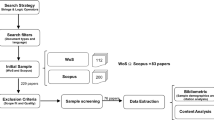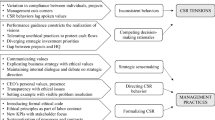Abstract
We investigate information systems (IS) projects as a liminal space ‘betwixt and between’ the status quo and the new environment, using a case study of the implementation of an enterprise system (ES). This liminal space provides a stabilizing platform whereupon the project team can develop new and potentially transformative IS. However, after a project team has completed its initial IS design for roll-out, this liminal space must be bridged to incorporate process-generated learning and new systems back into the organizational working environment. We demonstrate how this bridging involves negotiations that attempt to reconcile divergent perspectives by adopting a conciliatory or peacemaking attitude. As such, our analysis focuses on the IS project as a multi-phased process that includes the creation of a liminal space for the project team during development and on the negotiations that ensure the ES becomes a working IS in the post-implementation environment.
Similar content being viewed by others
References
Ahn, J. and Skudlark, A. (1997). Resolving Conflicts of Interest in the Process of an Information Systems Implementation for Advanced Telecommunication Services, Journal of Information Technology 12 (1): 3–13.
Bauer, M. (1996). The Narrative Interview: Comments on a technique for qualitative data collection, London: School of Economics and Political Science.
Bruner, J.S . (1986). Actual Minds, Possible World, Cambridge, Mass: Harvard University Press.
Bruner, J.S (1990). Acts of Meaning, Harvard University Press, Cambridge, MA.
Cherns, A. (1976). The Principles of Sociotechnical Design, Human Relations 2 (9): 783–792.
Czarniawska, B. and Mazza, C. (2003). Consulting As a Liminal Space, Human Relations 56 (3): 267–290.
Engwall, M. (2003). No Project Is an Island: Linking projects to history and context, Research Policy 32 (5): 789–808.
Gann, D.M. and Salter, A.J. (2000). Innovation in Project-based, Service Enhanced Firms: The construction of complex products and systems, Research Policy 29 (7–8): 955–972.
Garsten, C. (1999). Between and Betwixt: Temporary employees as liminal subjects in flexible organizations, Organization Studies 20 (4): 601–617.
Hagen, R., Miller, S. and Johnson, M. (2003). The ‘Disruptive Consequences’ of Introducing a Critical Management Perspective onto an MBA Programme, Management Learning 34 (2): 241–256.
Howard-Grenville, J., Golden-Biddle, K., Irwin, J. and Mao, J. (2011). Liminality as Cultural Process for Cultural Change, Organization Science 22 (2): 522–539.
Klein, H.K. and Myers, M.D. (1999). A Set of Principles for Conducting and Evaluating Interpretive Field Studies in Information Systems, MIS Quarterly 23 (1): 67–92.
Livari, J. and Livari, N. (2011). Varieties of User-centredness: An analysis of four systems development methods, Information Systems Journal 21 (2): 125–153.
Markus, M.L., Axline, S., Petrie, D. and Tanis, S.C. (2000). Learning from Adopters’ Experiences with ERP: Problems encountered and success achieved, Journal of Information Technology 15 (4): 245–265.
Newell, S., Huang, J. and Tansley, C. (2004). Social Capital and Knowledge Integration in an ERP Project Team: The importance of bridging AND bonding, British Journal of Management 15 (S1): 43–57.
Pickering, A. (1995). The Mangle of Practice, Time, Agency and Science, Chicago: University of Chicago Press.
Rottenburg, R. (2000). Sitting in a Bar, Studies in Cultures, Organizations and Societies 6 (1): 87–100.
Scarbrough, H., Swan, J., Laurent, S., Bresnen, M., Edelman, L. and Newell, S. (2004). Project-based Learning and the Role of Learning Boundaries, Organization Studies 25 (9): 1579–1600.
Shepherd, C., Clegg, C. and Stride, C. (2009). Opening the Black Box: A multi-method analysis of an enterprise resource planning implementation, Journal of Information Technology 24 (1): 81–102.
Star, S.L. (1991). Power, Technologies and the Phenomenology of Standards: On being allergic to onions, in J. Law (ed.) A Sociology of Monsters? Power, technology and the modern world, Sociological Review Monograph, Oxford: Basil Blackwell, pp. 27–57.
Tempest, S. and Starkey, K. (2004). The Effects of Liminality on Individual and Organizational Learning, Organization Studies 25 (4): 507–527.
Turner, V. (1969). The Ritual Process: Structure and anti-structure, Chicago: Aldine.
Turner, V. (1977). The Ritual Process, Ithaca, NY: Cornell University Press.
Turner, V. (1982). From Ritual to Theatre: The Human Seriousness of Play, New York: PAJ Publications.
Van Gennup, A. (1909). The Rites of Passage, London: Routledge and Kegan Paul.
Walsham, G. (1993). Interpreting Information Systems in Organization, Chichester: John Wiley & Sons.
Wagner, E. (1998). Communities of Practice: Learning, Meaning and Identity, New York: Cambridge University Press.
Wagner, E. and Newell, S. (2006). Repairing ERP: Producing social order to create a working information system, Journal of Applied Behavioral Science 42 (1): 40–57.
Author information
Authors and Affiliations
Rights and permissions
About this article
Cite this article
Wagner, E., Newell, S. & Kay, W. Enterprise systems projects: the role of liminal space in enterprise systems implementation. J Inf Technol 27, 259–269 (2012). https://doi.org/10.1057/jit.2012.22
Published:
Issue Date:
DOI: https://doi.org/10.1057/jit.2012.22




